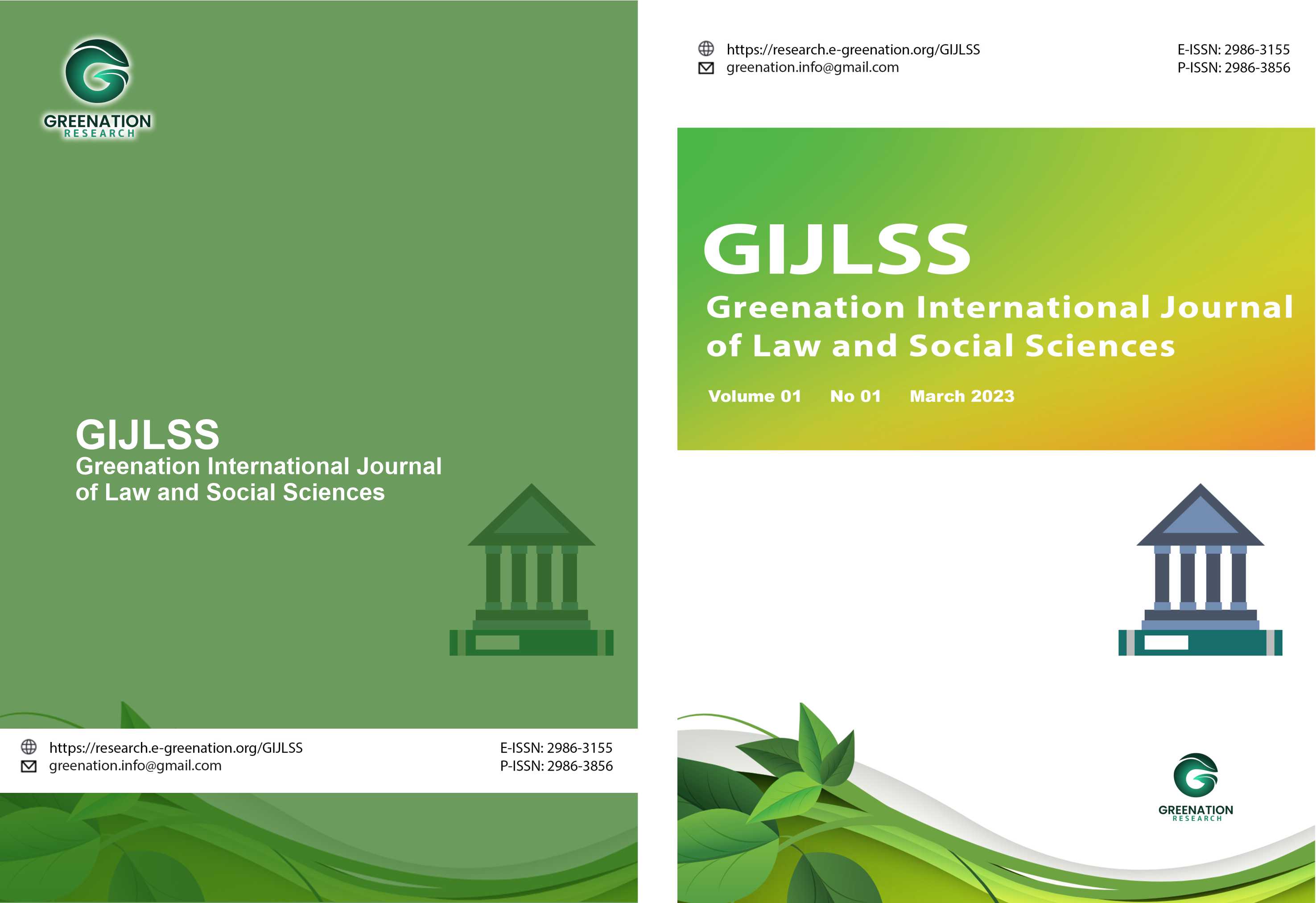The Urgency of Regulatory Reformulation and Strengthening the Capacity of Law Enforcers in Combating Cybercrime Through a Criminal Law Approach in Indonesia
DOI:
https://doi.org/10.38035/gijlss.v3i2.416Keywords:
Criminal Law, Cybercrime, UU ITE, Law EnforcementAbstract
The rapid development of information technology has had a significant impact on various aspects of life, including the emergence of various forms of increasingly complex cybercrime. Cybercrime includes various illegal acts carried out through the internet network including personal data theft, dissemination of hoax information, hacking, and digital-based financial crimes. In Indonesia, the Electronic Information and Transactions Law (UU ITE) serves as the main instrument in regulating and prosecuting cybercrimes. Criminal law plays an important role in imposing sanctions on cybercrime perpetrators and providing legal protection for the community. However, in its implementation, law enforcement against cybercrime faces various challenges, such as the weak capacity of law enforcement officers, limited regulations that are adaptive to technological developments, and jurisdictional issues in handling cross-border cybercrime. This study aims to analyze the role of criminal law in dealing with cybercrime through the Electronic Information and Transactions Law (UU ITE) and identify the challenges faced in the enforcement process. This study uses a normative research method with a statute approach and a case approach. The legislative approach examines various regulations governing cybercrime in Indonesia, particularly the Electronic Information and Transactions Law (UU ITE) and other related provisions. Meanwhile, the case study approach analyzes several resolved cybercrime cases in Indonesia to evaluate the practical effectiveness of criminal law enforcement. The findings of this research are expected to provide a more comprehensive understanding of criminal law effectiveness in addressing cybercrime, as well as offer recommendations for enhancing regulatory efficacy and law enforcement practices in Indonesia.
References
Akbar, M. A. (2024). Efektivitas Peran Kepolisan Terhadap Penegakan Hukum Tindak Pidana Penipuan Online Di Dunia Maya. Journal of Lex Philosophy (JLP), 5(2), 877-893.
Al Hadad, A. (2020). Politik Hukum dalam Penerapan Undang-Undang ITE; untuk Menghadapi Dampak Revolusi Industri 4.0. Khazanah Hukum, 2(2), 65-72.
Alviani, C. D. (2024). Keamanan Siber di Masa Depan: Tantangan dan Teknologi yang Dibutuhkan. Prosiding Seminar Nasional Amikom Surakarta, 2, 1247-1254.
Darmawan, D. T. (2023). Manajemen Sumber Daya Manusia Era Digital. Jambi: PT. Sonpedia Publishing Indonesia.
Dermawan, A. &. (2020). Urgensi Perlindungan Hukum Bagi Korban Tindak Pidana Kejahatan Teknologi Informasi. Journal of science and social research, 2(2), 39-46.
Dinda, A. L. (2024). Efektivitas Penegakan Hukum Terhadap Kejahatan Siber di Indonesia. Al-Dalil: Jurnal Ilmu Sosial, Politik, Dan Hukum, 2(2), 69-77.
Judijanto, L. (2025). Hukum Pidana dan Kejahatan Siber: Menanggulangi Ancaman Kejahatan Digital di Era Teknologi. Indonesian Research Journal on Education, 5(1), 968-972.
Lubis, F. (2020). Analisis Kebijakan Pengendalian Pelaku Hoax dan Ujaran Kebencian. Perspektif, 9(1), 79-86.
Najwa, F. R. (2024). Analisis Hukum Terhadap Tantangan Keamanan Siber: Studi Kasus Penegakan Hukum Siber di Indonesia. AL-BAHTS: Jurnal Ilmu Sosial, Politik, dan Hukum, 2(1), 8-16.
Nugraha, R. (2021). Perspektif Hukum Indonesia (Cyberlaw) Penanganan Kasus Cyber Di Indonesia. Jurnal Ilmiah Hukum Dirgantara, 11(2).
Oktaviani, A. (2023). Alternatif Pidana Bagi Pelaku Tindak Pidana Peretasan Di Indonesia Dalam Undang-Undang Informasi Dan Transaksi Elektronik. Novum: Jurnal Hukum, 249-264.
Pangestika, E. Q. (2024). Penerapan Prinsip Hukum Internasional Dalam Penegakan Hukum Terhadap Kejahatan Siber Dan Serangan Siber. Jurnal Review Pendidikan dan Pengajaran (JRPP), 7(2), 5782-5788.
Rohmy, A. M. (2021). UU ITE dalam Perspektif Perkembangan teknologi informasi dan komunikasi. Dakwatuna: Jurnal Dakwah dan Komunikasi Islam, 7(2), 309-339.
Salsabilla, A. &. (2024). Peran Hukum Pidana Dalam Menangani Kejahatan Siber pada Masa Sekarang: Tinjauan Terhadap Undang Undang Informasi Transaksi Elektronik. Journal of Education Religion Humanities and Multidiciplinary, 2(2), 1548-1554.
Saputra, A. K. (2024). Rekonstruksi Penegakan Hukum Tindak Pidana Siber di Indonesia. SEIKAT: Jurnal Ilmu Sosial, Politik dan Hukum, 3(1), 63-70.
Setiawan, D. A. (2024). Strategi Penanggulangan Kejahatan Ekonomi Berbasis Teknologi: Studi Komparatif Antara Indonesia, Amerika, Dan Eropa. Masalah-Masalah Hukum, 53(1), 79-90.
Tobing, C. I. (2024). Globalisasi Digital Dan Cybercrime: Tantangan Hukum Dalam Menghadapi Kejahatan Siber Lintas Batas. Jurnal Hukum Sasana, 10(2), 105-123.
Wati, D. S. (2024). Dampak Cyber Crime Terhadap Keamanan Nasional dan Strategi Penanggulangannya: Ditinjau Dari Penegakan Hukum. Jurnal Bevinding, 2(01), 44-55.
Yamin, A. F. (2024). Perlindungan Data Pribadi Dalam Era Digital: Tantangan Dan Solusi. Meraja journal, 7(2), 138-155.
Yuniarti, S. (2022). Petugas/Pejabat Pelindungan Data Pribadi dalam Ekosistem Perlindungan Data Pribadi: Indonesia, Uni Eropa dan Singapura. Business Economic, Communication, and Social Sciences Journal (BECOSS), 4(2), 111-120.
Downloads
Published
How to Cite
Issue
Section
License
Copyright (c) 2025 Muhammad Gustryan, Abdullah Sulaiman

This work is licensed under a Creative Commons Attribution 4.0 International License.
Copyright :
Authors who publish their manuscripts in this journal agree to the following conditions:
- Copyright in each article belongs to the author.
- The author acknowledges that the Greenation International Journal of Law and Social Sciences (GIJLSS) has the right to be the first to publish under a Creative Commons Attribution 4.0 International license (Attribution 4.0 International CC BY 4.0).
- Authors can submit articles separately, arrange the non-exclusive distribution of manuscripts that have been published in this journal to other versions (for example, sent to the author's institutional repository, publication in a book, etc.), by acknowledging that the manuscript has been published for the first time at GIJLSS.























